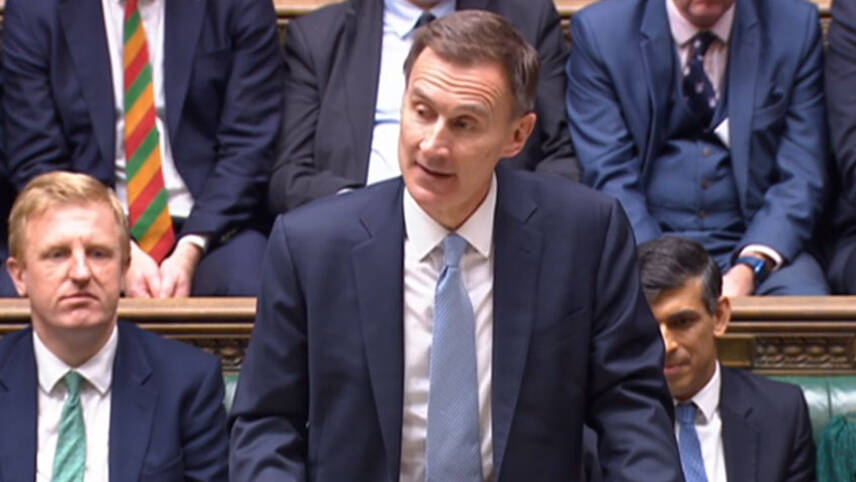Register for free and continue reading
Join our growing army of changemakers and get unlimited access to our premium content

Image: Parliament Live TV
Hunt set out what he called “a Budget for long-term growth” in Parliament today (6 March), detailing a string of cuts and freezes to taxes including a 2p reduction in National Insurance rates and changes to Child Benefit thresholds.
The speech itself drew raucous chatter from across the Commons with the Deputy Speaker having to intervene half a dozen times. Opposition MPs bemoaned the Chancellor’s decision to focus on tax cuts rather than in boosting funding for public services.
The Commons also erupted as Hunt attempted to differentiate his Party’s approach from the energy transition and electric vehicle (EV) transition to Labour’s.
On vehicles, Hunt confirmed another freeze to fuel duty, speaking of £50 in avoided extra costs for the average car driver over the next year.
He said: “The Shadow Chancellor complained about the freeze on fuel duty, and Labour has opposed it at every opportunity. The Labour Mayor of London wants to punish motorists even more with his Ultra-Low Emission Zone (ULEZ) plans, but lots of families and sole traders depend on their cars.
“If I did nothing, fuel duty would increase by 13% this month.”
Rowing over the expansion of London’s ULEZ ultimately sowed the seeds for Conservative MPs to successfully campaign for the Prime Minister to row back on a raft of green policies, citing the upfront costs to members of the general public.
Environmental groups will doubtless be disappointed but not surprised at Hunt’s approach to fuel duty. Green Party MP Caroline Lucas stated that consecutive fuel duty freezes have hampered the low-carbon transition in road transport and have benefitted the wealthy more than the poor.
Hunt also stated that Labour’s plan to bring unabated gas-fired electricity generation offline by 2030, five years sooner than the incumbent Government, could only be delivered with “tax rises on working families”.
A handful of energy transition measures
On the flipside, however, Hunt spoke of the need to increase Government and private sector investment in priority industries for innovation and growth, including clean energy.
Hunt allocated up to a further £120m to the Green Industries Growth Accelerator, which supports the expansion of supply chains in fields such as offshore wind, hydrogen and carbon capture.
He also reiterated a promise for a new grid connections process for renewable energy arrays to be in place by January 2025. The Government is currently working on reforms with the National Infrastructure Commission and energy regulator Ofgem.
Ministers have repeatedly been told by developers that some projects face grid connection waiting times exceeding eight years. The Government itself has recorded a 65% increase in delivery times for Nationally Significant Infrastructure Projects since 2012.
Hunt additionally confirmed that the Government will acquire the site for the decomissioned Wylfa nuclear power plant from previous developer Hitachi and stated that Great British Nuclear – a new arms-length body – will extend its innovation funding competition for small modular reactors (SMRs) to a second round. An initial round of more than £150m was confirmed in July last year.
Little further detail was offered. This will disappoint MPs on the Environmental Audit Committee (EAC) who last month asked for more clarity on Great British Nuclear’s long-term, strategic direction, including how it expects SMRs to deliver value for money compared to renewables.
In the oil and gas sector, Hunt extended the Energy Profits Levy until March 2029. The Levy taxes fossil fuel companies at a rate of 35%, bringing their total tax burden to 75%.
There was no word on decoupling the levy from a controversial investment allowance enabling companies to claim back up to 90% of their tax rate if they were investing in new exploration and/or extraction capacity.
Industrial strategy
Hunt offered little in the way of explanation on his Government’s strategic plans to support green manufacturing sectors.
He built on a £2bn package for EV manufacturers and £900m for clean energy component manufacturers, first announced late 2023, with £270m for additional industries. This package includes funding for zero-emission aircraft and innovative aviation fuels.
Bodies including the Confederation of British Industry (CBI) had been pushing for a more detailed Net-Zero Investment Plan to feed into an updated Industrial Strategy. This was not forthcoming.
CBI Economics representatives spoke on a press call earlier this month of a “piecemeal” approach to industrial strategizing from the Conservatives, relying on one-off announcements rather than regular and comprehensive updates.
One CBI recommendation that was taken on board by Hunt, however, was the extension of full expensing to cover leased and rented business assets. Full expensing for purchased assets was made permanent at the 2023 Autumn Statement. Hunt described this change as “the single most transformational thing we could do to fire up the British economy”.
Green finance focus?
Buried in the Budget documents was confirmation that the UK Government would like the Financial Conduct Authority (FCA) to regulate the provision of ESG ratings in order to weed out greenwashing.
This decision has been taken following consultations in spring/summer 2023. Further consultations will follow later this year.
Hunt also spoke of new powers and reforms at the FCA and the Pensions Regulator intended to de-risk investment in British start-ups and scale-ups, including those in cleantech fields.
There was no update, as the CBI and UKSIF had been hoping for, on the UK’s overarching Green Finance Taxonomy. This was promised as part of last spring’s Green Finance Strategy but was not ready on time.


Please login or Register to leave a comment.